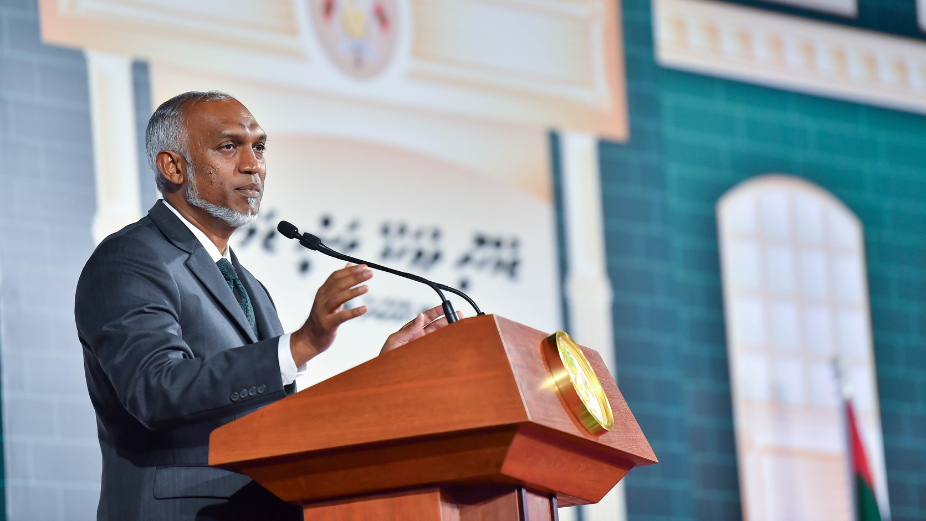
During the Republic Day celebrations at Dharubaaruge on Sunday evening, President Dr Mohamed Muizzu detailed a series of economic and environmental reforms aimed at addressing the Maldives’ fiscal challenges and promoting sustainable development.
Economic Reforms and Fiscal Policies
President Muizzu announced that the 2025 budget is designed to promote economic justice by redistributing wealth and addressing systemic imbalances. He highlighted consultations with international financial institutions to implement reforms in key areas, including the subsidy system, the Aasandha insurance scheme, the pension system, and state-owned enterprises (SoEs). The President assured that the budget would prioritise support for the most vulnerable populations.
Emphasising fiscal responsibility, President Muizzu stated that the government has refrained from printing money to tackle economic challenges and has halted deficit financing through borrowing. He noted efforts to recover outstanding funds over the past year, contributing to a reduction in national debt. The President also mentioned that all bills under MVR 5 million had been settled, aiming to strengthen the economy by improving citizens’ financial well-being.
Economic Diversification and International Trade
The President discussed initiatives to diversify and reform the economy, including facilitating the introduction of banking services, establishing the International Finance Services Authority, and exploring the use of digital currency. He mentioned ongoing efforts to establish free trade agreements with China and Turkey, with plans to pursue similar agreements with India and the UK.
Tourism and Infrastructure Development
President Muizzu highlighted that the opening of the new terminal at Velana International Airport is expected to usher in a new era for tourism in the Maldives, with a target of attracting over 2 million tourists. The tourism sector remains a cornerstone of the Maldivian economy, contributing significantly to GDP and employment.
Agricultural Development and Food Security
Reflecting on the government’s efforts to diversify the economy, President Muizzu noted significant progress in the agriculture sector. The establishment of a separate Ministry of Agriculture aims to focus efforts and strategic investments in the sector. An important agreement has been signed to foster increased investment opportunities in agriculture, with the goal of reducing reliance on food imports and ensuring greater food security for the Maldivian people.
Environmental Initiatives and Climate Change
Addressing environmental issues and the impact of climate change, President Muizzu pledged to advocate for citizens’ rights in the face of critical challenges. He announced his intention to attend the COP-29 summit in Azerbaijan, aiming to secure compensation from those responsible for environmental destruction.
The President highlighted the country’s ecological fragility and the need for regional development, emphasising that climate change is an undeniable reality. He outlined key initiatives undertaken over the past year, including increasing the share of eco-friendly and clean energy to 33% of the nation’s total energy consumption. Over the past year, 15 MW of solar power has been generated, with a 164 MW solar power generation project currently in progress.
Additionally, 400,000 trees have been planted as part of the ‘Magey Solar Project,’ contributing towards the goal of planting 5 million trees to make the country greener. Plans are underway to establish a biosphere reserve on three additional islands, complementing efforts in Baa Atoll. Seventeen islands have been designated for environmental conservation, with initiatives such as the installation of rubbish bins, the donation of special waste collection vehicles to 99 islands, and other waste management support.
President Muizzu’s address outlines a comprehensive approach to addressing the Maldives’ economic and environmental challenges. While the proposed reforms and initiatives aim to promote economic justice and sustainability, the country continues to face significant fiscal constraints and environmental vulnerabilities. The success of these initiatives will depend on effective implementation, strategic investments, and continued collaboration with international partners to navigate the complex landscape of economic development and climate change.












